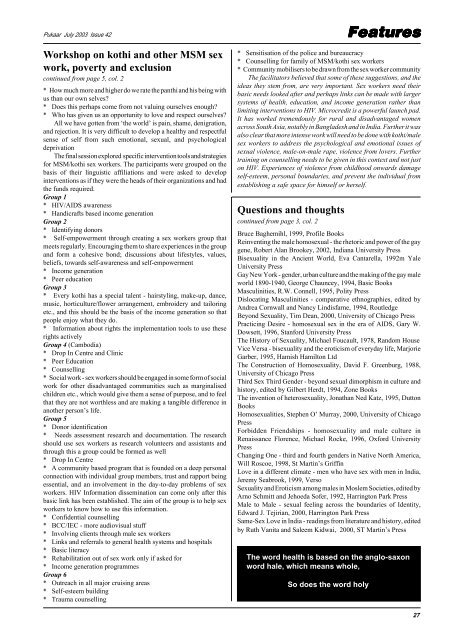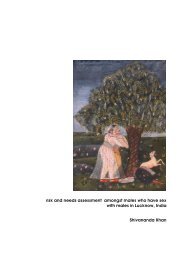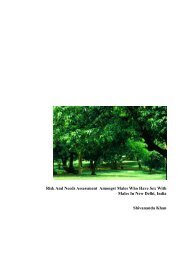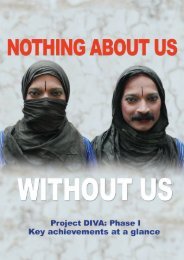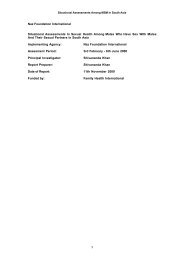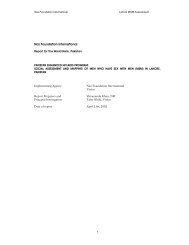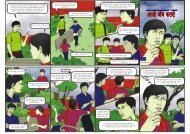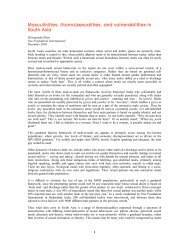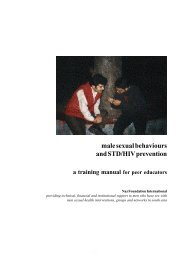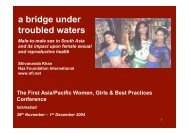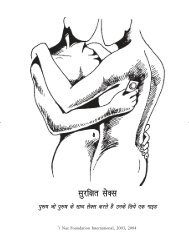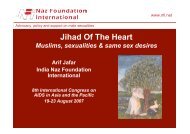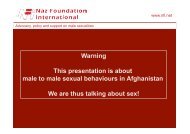Features - Naz Foundation International
Features - Naz Foundation International
Features - Naz Foundation International
You also want an ePaper? Increase the reach of your titles
YUMPU automatically turns print PDFs into web optimized ePapers that Google loves.
Pukaar July 2003 Issue 42<br />
Workshop on kothi and other MSM sex<br />
work, poverty and exclusion<br />
continued from page 5, col. 2<br />
* How much more and higher do we rate the panthi and his being with<br />
us than our own selves?<br />
* Does this perhaps come from not valuing ourselves enough?<br />
* Who has given us an opportunity to love and respect ourselves?<br />
All we have gotten from ‘the world’ is pain, shame, denigration,<br />
and rejection. It is very difficult to develop a healthy and respectful<br />
sense of self from such emotional, sexual, and psychological<br />
deprivation<br />
The final session explored specific intervention tools and strategies<br />
for MSM/kothi sex workers. The participants were grouped on the<br />
basis of their linguistic affiliations and were asked to develop<br />
interventions as if they were the heads of their organizations and had<br />
the funds required.<br />
Group 1<br />
* HIV/AIDS awareness<br />
* Handicrafts based income generation<br />
Group 2<br />
* Identifying donors<br />
* Self-empowerment through creating a sex workers group that<br />
meets regularly. Encouraging them to share experiences in the group<br />
and form a cohesive bond; discussions about lifestyles, values,<br />
beliefs, towards self-awareness and self-empowerment<br />
* Income generation<br />
* Peer education<br />
Group 3<br />
* Every kothi has a special talent - hairstyling, make-up, dance,<br />
music, horticulture/flower arrangement, embroidery and tailoring<br />
etc., and this should be the basis of the income generation so that<br />
people enjoy what they do.<br />
* Information about rights the implementation tools to use these<br />
rights actively<br />
Group 4 (Cambodia)<br />
* Drop In Centre and Clinic<br />
* Peer Education<br />
* Counselling<br />
* Social work - sex workers should be engaged in some form of social<br />
work for other disadvantaged communities such as marginalised<br />
children etc., which would give them a sense of purpose, and to feel<br />
that they are not worthless and are making a tangible difference in<br />
another person’s life.<br />
Group 5<br />
* Donor identification<br />
* Needs assessment research and documentation. The research<br />
should use sex workers as research volunteers and assistants and<br />
through this a group could be formed as well<br />
* Drop In Centre<br />
* A community based program that is founded on a deep personal<br />
connection with individual group members, trust and rapport being<br />
essential, and an involvement in the day-to-day problems of sex<br />
workers. HIV Information dissemination can come only after this<br />
basic link has been established. The aim of the group is to help sex<br />
workers to know how to use this information.<br />
* Confidential counselling<br />
* BCC/IEC - more audiovisual stuff<br />
* Involving clients through male sex workers<br />
* Links and referrals to general health systems and hospitals<br />
* Basic literacy<br />
* Rehabilitation out of sex work only if asked for<br />
* Income generation programmes<br />
Group 6<br />
* Outreach in all major cruising areas<br />
* Self-esteem building<br />
* Trauma counselling<br />
Questions and thoughts<br />
continued from page 3, col. 2<br />
<strong>Features</strong><br />
* Sensitisation of the police and bureaucracy<br />
* Counselling for family of MSM/kothi sex workers<br />
* Community mobilisers to be drawn from the sex worker community<br />
The facilitators believed that some of these suggestions, and the<br />
ideas they stem from, are very important. Sex workers need their<br />
basic needs looked after and perhaps links can be made with larger<br />
systems of health, education, and income generation rather than<br />
limiting interventions to HIV. Microcredit is a powerful launch pad.<br />
It has worked tremendously for rural and disadvantaged women<br />
across South Asia, notably in Bangladesh and in India. Further it was<br />
also clear that more intense work will need to be done with kothi/male<br />
sex workers to address the psychological and emotional issues of<br />
sexual violence, male-on-male rape, violence from lovers. Further<br />
training on counselling needs to be given in this context and not just<br />
on HIV. Experiences of violence from childhood onwards damage<br />
self-esteem, personal boundaries, and prevent the individual from<br />
establishing a safe space for himself or herself.<br />
Bruce Baghemihl, 1999, Profile Books<br />
Reinventing the male homosexual - the rhetoric and power of the gay<br />
gene, Robert Alan Brookey, 2002, Indiana University Press<br />
Bisexuality in the Ancient World, Eva Cantarella, 1992m Yale<br />
University Press<br />
Gay New York - gender, urban culture and the making of the gay male<br />
world 1890-1940, George Chauncey, 1994, Basic Books<br />
Masculinities, R.W. Connell, 1995, Polity Press<br />
Dislocating Masculinities - comparative ethnographies, edited by<br />
Andrea Cornwall and Nancy Lindisfarne, 1994, Routledge<br />
Beyond Sexuality, Tim Dean, 2000, University of Chicago Press<br />
Practicing Desire - homosexual sex in the era of AIDS, Gary W.<br />
Dowsett, 1996, Stanford University Press<br />
The History of Sexuality, Michael Foucault, 1978, Random House<br />
Vice Versa - bisexuality and the eroticism of everyday life, Marjorie<br />
Garber, 1995, Hamish Hamilton Ltd<br />
The Construction of Homosexuality, David F. Greenburg, 1988,<br />
University of Chicago Press<br />
Third Sex Third Gender - beyond sexual dimorphism in culture and<br />
history, edited by Gilbert Herdt, 1994, Zone Books<br />
The invention of heterosexuality, Jonathan Ned Katz, 1995, Dutton<br />
Books<br />
Homosexualities, Stephen O’ Murray, 2000, University of Chicago<br />
Press<br />
Forbidden Friendships - homosexuality and male culture in<br />
Renaissance Florence, Michael Rocke, 1996, Oxford University<br />
Press<br />
Changing One - third and fourth genders in Native North America,<br />
Will Roscoe, 1998, St Martin’s Griffin<br />
Love in a different climate - men who have sex with men in India,<br />
Jeremy Seabrook, 1999, Verso<br />
Sexuality and Eroticism among males in Moslem Societies, edited by<br />
Arno Schmitt and Jehoeda Sofer, 1992, Harrington Park Press<br />
Male to Male - sexual feeling across the boundaries of Identity,<br />
Edward J. Tejirian, 2000, Harrington Park Press<br />
Same-Sex Love in India - readings from literature and history, edited<br />
by Ruth Vanita and Saleem Kidwai, 2000, ST Martin’s Press<br />
The word health is based on the anglo-saxon<br />
word hale, which means whole,<br />
So does the word holy<br />
27


